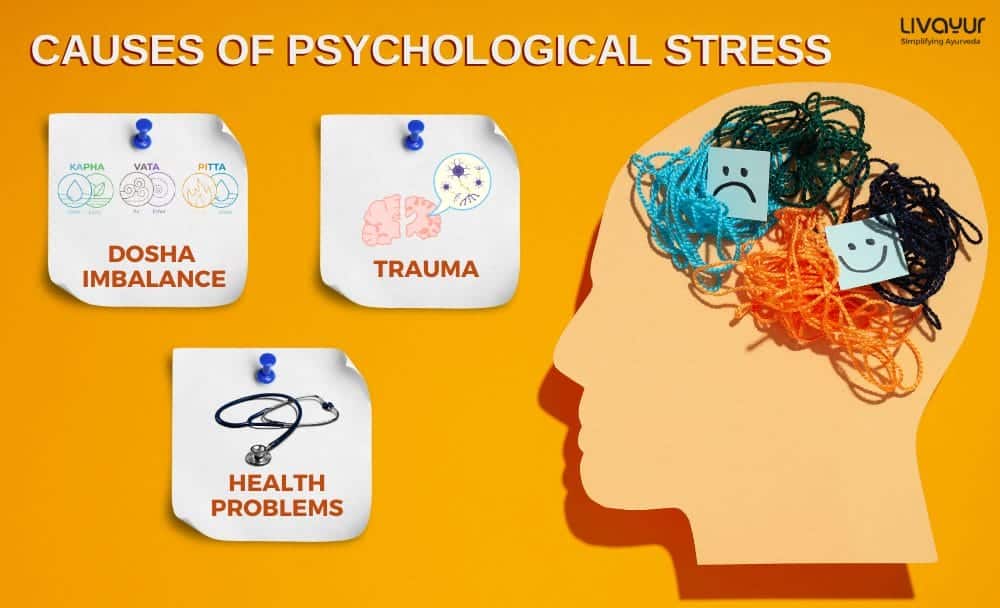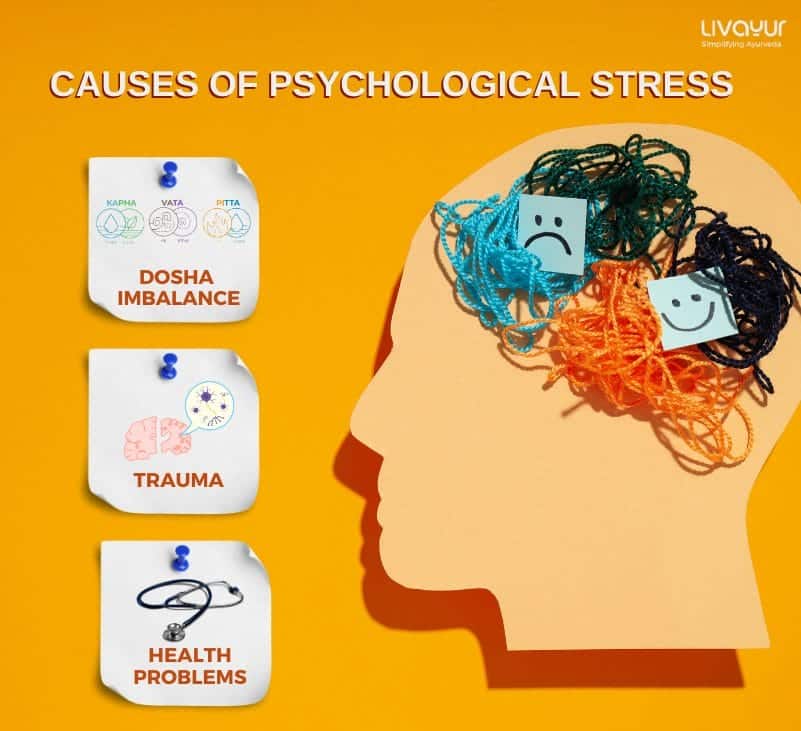
Stress is a normal part of life that everyone experiences from time to time. Psychological stress, also known as emotional stress, refers to the response of the body and mind to challenging situations or events that are perceived as threatening, dangerous, or overwhelming. [1] Ayurvedic texts discuss the concept of “Manas” or the mind, which is considered one of the three pillars of health, along with the body and spirit. [2] While some level of stress is normal and can even be beneficial in certain situations, chronic or excessive stress can lead to physical and mental health problems.
In this article, we will discuss the different types of psychological stress, their causes, symptoms, and treatment options, as well as answer some frequently asked questions about stress.
Types of Psychological Stress
Psychological stress can be categorized into two main types: acute stress and chronic stress.
Acute Stress
Acute stress is a short-term type of stress that occurs in response to a specific event or situation. It is often referred to as the “fight or flight” response, as it prepares the body to either face or flee from a perceived threat. Acute stress can be caused by various events such as a job interview, a car accident, or a sudden illness. [1] [3]
Chronic Stress
Chronic stress is a long-term type of stress that occurs when a person experiences ongoing stressors or stressful situations. This type of stress can be caused by factors such as financial problems, relationship issues, or a demanding job. Chronic stress can lead to physical and mental health problems if not managed effectively. [1] [4]
Causes of Psychological Stress

The causes of psychological stress can vary from person to person, but some common causes include:
Life changes: Major life events such as marriage, divorce, or the death of a loved one can be sources of stress. [5]
Work stress: Work-related stress can be caused by factors such as a heavy workload, unrealistic expectations, or difficult colleagues. [5]
Financial stress: Financial problems such as debt or job loss can lead to chronic stress. [5]
Health problems: Serious or chronic health problems can be sources of stress. [5]
Trauma: Traumatic events such as physical or emotional abuse, violence, or natural disasters can cause psychological stress. [5]
Dosha imbalance: According to Ayurveda, stress is caused by an imbalance in the three doshas or energies in the body – Vata, Pitta, and Kapha. Imbalances in these doshas can lead to mental and emotional disturbances, including stress, anxiety, and depression. [2]
Symptoms of Psychological Stress
Psychological stress can cause a range of physical and emotional symptoms, including:
Physical symptoms: Headaches, muscle tension, fatigue, and digestive problems. [5]
Emotional symptoms: Anxiety, irritability, anger, and depression. [5]
Cognitive symptoms: Difficulty concentrating, memory problems, and negative thinking. [5]
Behavioural symptoms: Social withdrawal, overeating, or substance abuse. [5]
Treatment Options for Psychological Stress
Effective stress management can help individuals reduce the negative impact of stress on their physical and mental health. Some common stress management techniques include:

Lifestyle changes: Practising healthy habits such as regular exercise, a balanced diet, and sufficient sleep can help manage stress. [1] [5]

Relaxation techniques: Techniques such as meditation, deep breathing, or yoga can help individuals relax and manage stress. [1] [5]
Counselling: Professional counselling can help individuals learn coping strategies and address underlying issues that contribute to stress. [1] [5]
Medications: In some cases, medications such as anti-anxiety drugs or antidepressants may be prescribed to manage stress. [1] [5]
Ayurvedic Remedies for Psychological Stress
Ayurveda offers a holistic approach to managing stress, which includes lifestyle modifications, dietary changes, and herbal remedies.
Some common Ayurvedic remedies for stress include yoga, meditation, pranayama (breathing exercises), massage, and the use of specific herbs and spices such as Ashwagandha, Brahmi, Turmeric, and Ginger in medical preparations. Ayurveda also emphasizes the importance of maintaining a healthy daily routine, known as “Dinacharya“, which includes activities such as waking up early, practising self-care, and getting adequate sleep. [2]
These remedies however are not standalone treatments for psychological stress and work only when used in conjunction with conventional treatments in modern medicine. It is recommended to see a medical practitioner if you experience any symptoms of stress before self-medicating.
FAQs
1. How can I tell if I am experiencing psychological stress?
You may be experiencing psychological stress if you have symptoms such as anxiety, irritability, headaches, or muscle tension.
2. What are some effective ways to manage psychological stress?
Effective stress management techniques include lifestyle changes, relaxation techniques, counselling, and medications.
3. Can psychological stress lead to physical health problems?
Yes, chronic or excessive psychological stress can lead to physical health problems such as cardiovascular disease, digestive problems, or a weakened immune system.
4. How can I prevent psychological stress?
While it is not always possible to completely prevent psychological stress, there are steps that can be taken to reduce the likelihood and impact of stress. This includes practising stress management techniques, maintaining a healthy lifestyle, and seeking support from friends, family, or mental health professionals when needed.
5. When should I seek professional help for psychological stress?
Individuals should seek professional help for psychological stress if they experience symptoms that interfere with their daily life, or if they have difficulty managing stress on their own. Professional help may include counselling, therapy, or medication.
Conclusion
Psychological stress is a common experience that can have a significant impact on an individual’s physical and mental health. Understanding the different types of stress, their causes, symptoms, and treatment options can help individuals manage stress more effectively and improve their overall well-being. Practising healthy habits, learning relaxation techniques, seeking support, and seeking professional help when needed are all effective ways to manage psychological stress.
Disclaimer: This article is from a health and wellness perspective only and does not constitute medical advice. Kindly seek the help of a trained medical practitioner before initiating any treatment.
References:
- The impact of stress on body function: A review – PMC (nih.gov)
- Concept Of Mental Health In Ayurveda (researchgate.net)
- Acute Stress Disorder – StatPearls – NCBI Bookshelf (nih.gov)
- Stress won’t go away? Maybe you are suffering from chronic stress (apa.org)
- Psychological Stress – an overview | ScienceDirect Topics






















1 Comments
Comments are closed.